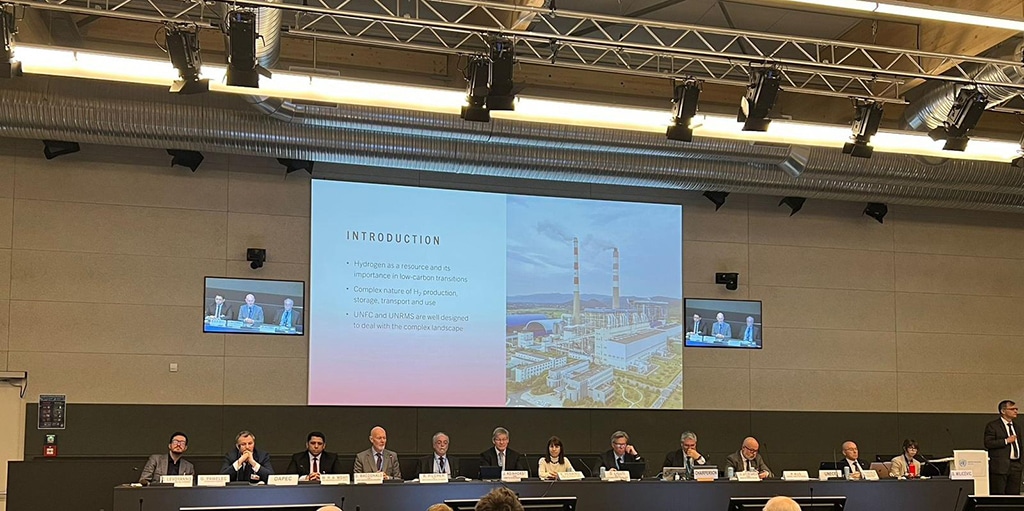GENEVA: The General Secretariat of the Organization of Arab Petroleum Exporting Countries (OAPEC) participated in the activities of the tenth session of the United Nations Gas Experts Group, which was held at the United Nations headquarters in Geneva from March 23-24. Representatives of the member states of the European Economic Commission and representatives of the European Commission participated in the meeting.
Number of European and international institutions and organizations participated as well, including the International Gas Union, the Hydrogen Foundation in Europe, the International Gas Center in Geneva, and the World Health Organization, in addition to representatives of international oil companies, experts, and academics.
 GENEVA: Eng Wael Hamid Abdel Moti presents OAPEC's vision on blue hydrogen at the tenth session of the United Nations Gas Experts Group in Geneva.
GENEVA: Eng Wael Hamid Abdel Moti presents OAPEC's vision on blue hydrogen at the tenth session of the United Nations Gas Experts Group in Geneva.The General Secretariat put forward its vision on blue hydrogen, by presenting a paper in the hydrogen session entitled “Prospects for Blue Hydrogen and Blue Ammonia in the Arab Region”, presented by Eng Wael Hamid Abdel Moti, an expert in gas industries in the organization, with representatives of the Hydrogen Council, the United Nations, and the Hydrogen Organization in Europe.
OAPEC representative explained that the Arab countries pay great attention to investing in hydrogen, to meet the expected future demand for it in major markets such as Europe and Asia, as well as to open a window for internal demand in some sectors such as the industrial sector and the transport sector.
He pointing out the increase in the number of hydrogen projects announced in the Arab countries at the beginning of 2023 to 73 projects with a diversified portfolio that includes the production and export of hydrogen, its transportation through pipelines, as well as its use in various types of transport applications.
He said that projects for the production of blue hydrogen produced from natural gas with carbon sequestration (and its derivatives blue ammonia) are of great interest to the Arab countries, which number is up to 13 projects, as the region is the least expensive in its production compared to the rest of the regions, which amounts to $ 1.4 per kg, compared to $2.5-3 per kg globally.
He added that the package of the blue hydrogen and blue ammonia projects that is being implemented, is the largest in terms of production capacity in the world, such as the blue ammonia production project with a capacity of 1 million tons annually within the “Taziz” integrated industrial system in the Ruwais complex in the United Arab Emirates, which is expected to be operational in 2025.
“Similarly, a blue ammonia production project in Qatar with a capacity of 1.2 million tons per year is expected to be operated in 2026 in addition to a global blue hydrogen production project in Jubail in Saudi Arabia with a capacity of 153,000 tons per year,” he addressed.
The representative pointed out that these and other projects will enable the Arab countries to lead in the blue ammonia market, becoming its largest exporter by 2030. “The Arab countries have begun to produce and export several experimental shipments of blue ammonia to major markets such as Japan, South Korea and Germany,” he said.
He concluded, “It should be noted that OAPEC has been participating in meetings of gas experts at the United Nations since 2016 in order to enhance cooperation with international institutions, present its vision on the most important developments in the gas and hydrogen industry, and exchange views on energy issues of common concern.”











